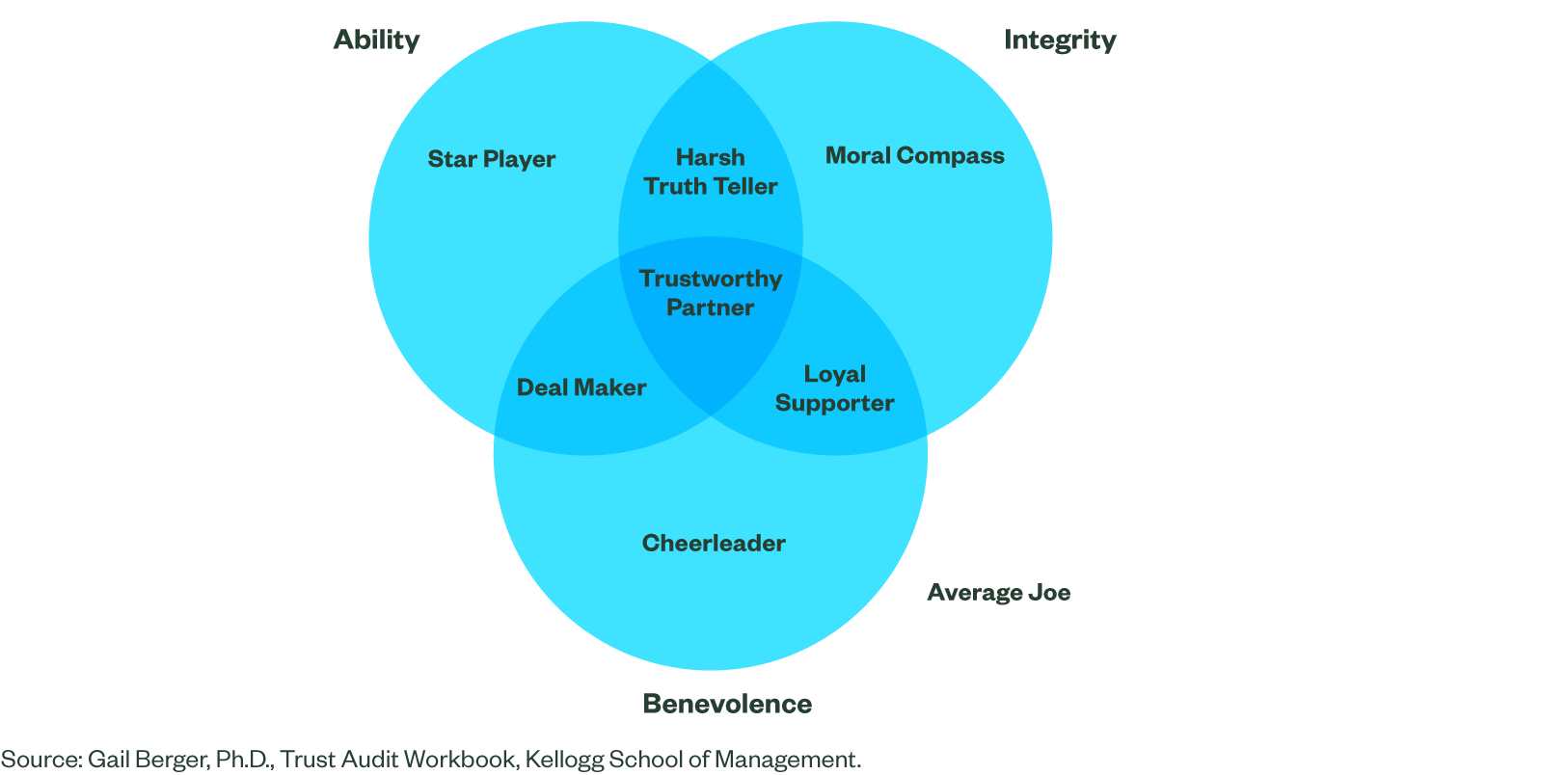Moment by Moment: Trust and Building Client Relationships
A better understanding of trust — defined as confidence in a person’s ability, benevolence, and integrity — can help advisors create memorable moments and build strong relationships.
Gail Berger, Ph.D., is a Clinical Professor at Northwestern University in the Kellogg School of Management, the McCormick School of Engineering, and the School of Communication. She is the Deputy Director of the Center for Executive Women at Kellogg. Dr. Berger is also an experienced executive coach and leadership development expert who is passionate about helping leaders and teams achieve their goals and improve their performance and effectiveness. She brings professional and academic experience in the areas of talent development and assessment, conflict resolution, and team dynamics. She has blended her background in education, business, and psychology to create a powerful approach to team building, leadership development, and executive coaching.
Each year, our SPDR® MasterClass program draws on the expertise of leading specialists like Dr. Berger to help advisors grow their businesses, keep pace with change, and better satisfy clients’ evolving needs.
In the financial services industry, trust is paramount. Trust is especially critical in an advisory setting — for example, when an individual hires an advisor, trust that the advisor will act in their best interest is the top decision factor.1
What is trust? Who do we trust, and how can we build trust? During a recent MasterClass, management expert Gail Berger, Ph.D., guided attendees through a thought-provoking session about the nature of trust and how to harness the power of moments to grow trust and strengthen relationships.
Making Moments Count
People remember moments, not days. We experience many, many moments in a day — more than 20,000 according to Nobel Prize Winner Daniel Kahneman — of which thousands include interactions with other people. When we think about leading others, managing others, and growing our relationships, we need to think about making each moment count by finding ways to build trust.
What Is Trust? Confidence in Ability, Benevolence, and Integrity
Trust is defined by confidence in the other person in three key areas:
- Ability Can the person accomplish what you need them to do? Is the person competent?
- Benevolence Does the person care about other people’s interests and needs? Is the person not self-interested?
- Integrity Does the person do what they say they will do?
True trustworthiness is confidence in competence (ability) plus confidence in character (benevolence and integrity).
We can use this framework to dissect why we do or don’t trust a person. “You might find some contradictions and surprises,” noted Dr. Berger. “You may realize a person has ability and integrity, but not benevolence, for example. I think these are important distinctions to unpack as you continue to build relationships with existing clients and as you grow your business with new people.” Keep in mind, there will be certain situations where you need a fully trustworthy partner; in other circumstances, however, you may need a star player who brings very high competence to the table, or you may prefer a cheerleader with an abundance of benevolence.

How to Build Instantaneous Trust
Others decide whether to trust you within milliseconds of meeting you. The decisive factor in this swift decision is warmth — a quality related to character. Most people, however, make a mistake by leading with competence instead of character.
Techniques to project warmth include:
- Posture – Use open and welcoming posture, not closed or guarded (e.g., with arms crossed in front of you).
- Voice – Lower your vocal pitch and volume, as if comforting a friend. Avoid raising the pitch of your voice toward the end of a sentence — it undercuts trust.
- Information – Share something personal to set a congenial tone and create rapport.
- Facial expression – Offer a genuine, sincere smile. When we smile, others mimic the smile and feel happy, too.
- Superfluous apology – Express regret for an undesirable circumstance for which you’re not responsible, e.g., “I’m so sorry about the rain today!”
Deepening Trust: How to Create Memorable Moments
While immediate trust is needed to start things off on the right foot, trust needs to deepen over time to strengthen a relationship. Moments matter: We can move from acquaintance to casual friend after spending 50 hours with a person. Add another 40 hours to move from casual friend to real friend, and yet another 100 hours to move to close friend.2
To build trust and fortify relationships over time, heed the magic 5:1 ratio of positive moments to negative moments. Think about your communication: Do you have too much negativity? Do you focus on the one thing a person did wrong instead of the 100 things they did right? Increase your ratio by reducing your negative comments and reinforcing good behaviors.
Managers can make moments count by incorporating impactful experiences — ones that are psychologically moving, emotional, or sensory — and creating immediate milestones to compel people to the finish line. Moments of positive alacrity also help: Create impromptu positivity by delivering an uplifting message or sending a “thinking of you” text.
Let moments be your superpower for building trust. By thinking differently about trust, advisors can develop the deep relationships with clients and colleagues needed to propel their practices forward.
Looking for more articles like this? Explore more of our Practice Management content.
MasterClass Insights: Level Up Your Learning

MasterClass Insights: Level Up Your Learning
Draw on the expertise of leading experts to help grow your business, keep pace with change, and better satisfy your clients’ evolving needs.